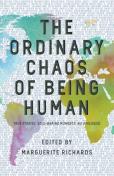BKMT READING GUIDES
The Ordinary Chaos of Being Human: True Stories. Soul-Baring Moments. No Apologies.
by Marguerite Richards
Paperback : 568 pages
1 club reading this now
0 members have read this book
Two schoolgirls in Yemen skip class, and wander into a yellow circus tent. A woman in Beirut is heartsick, waiting for her kidnapped parrot to return. A Jordanian man curses his ...
Introduction
"A simmering, wide-ranging collection of informative nonfiction. Our verdict: Get it." —Kirkus Reviews
Two schoolgirls in Yemen skip class, and wander into a yellow circus tent. A woman in Beirut is heartsick, waiting for her kidnapped parrot to return. A Jordanian man curses his loud, ignorant neighbors during a maddening, hot summer stuck in his Amman apartment.
This is an ambitious collection of short memoirs from 35 countries, a first-class ticket around the world to make friends with 41 real-life strangers, an ensemble that offers a contemporary view of Muslim cultures around the world. Each story reveals a depth of human experience in a way that you can’t help but recognize your own. An antidote to apathy in a world increasingly at odds with its own values, this book is one we didn’t know we needed until we found it.
“In these stories, we encounter death and destruction…but we also see love, resilience, and courage... stories that examine the internal wars fought by many people: to cope with emerging sexuality, straight and queer; to gain the acceptance of a community into which one has migrated or fled or sought asylum… the pains of growing up, the riotous adventures of childhood, the safe and loving arms of mothers, fathers, uncles and aunts, and always, the question: what and where is home?” Bina Shah, from her foreword in The Ordinary Chaos of Being Human.
The talented writers you'll meet: Hanan Al-Shaykh, Leila Aboulela, Indlieb Farazi Saber, Abeer Y. Hoque, Kamin Mohammadi, Ali Bader, Sholeh Wolpé, Youssef Rakha, Threa Almontaser, k. eltinaé, Sepideh Zamani, Medina Tenour Whiteman, Saedia Rouass, Asma Elbadawi, Hisham Bustani, Noreen Moustafa, Samina Hadi-Tabassum, Shokouh Moghimi, Barrak Alzaid, Lydia Abedeen, Duaa Randhawa, Ameena Hussein, H. Masud Taj, Neymat Raboobee, Mona Merhi, Samini Najmi, Criselda Yabes, Tharik Hussain, Marina Reza, Naazish YarKhan, Wasan Qasim, Shiraza Ibrahim, Fatima Muhammed, Amika Elfendi, Salahdin Imam, Wardah Abbas, Shirazuddin Siddiqi, Samia Ahmed, Erda? Göknar, Summi Siddiqui, and Amira Pierce.
“A collection that throbs with an authentic, earnest vulnerability. It is more soul-baring dinner conversations with fascinating strangers than a detached observation piece.” —Amanda Chin
“Each story is raw and beautifully written. This anthology is worthy of applause.” —Valerie Joy
Editorial Review
No Editorial Review Currently AvailableExcerpt
IntroductionI could lie. I could fudge a polite, digestible story about my clear-eyed, cloud-free path to celebrating the symphony of voices in this collection. But here’s the truth. It has been one of the hardest things I’ve ever done. I have been afraid to reveal how vulnerable my learning process has been, yet I’ve realized that I must. After all, I have asked the writers in this book to be that vulnerable: to share their most fragile moments—the blind corners, the velvety revelations, the mud-spattered terrain of their lives’ most pivotal moments. I should show them the same respect they’ve given me. ...
Discussion Questions
From the author:1. The Ordinary Chaos of Being Human is an exploration of the human condition through experiences led by people from diverse places. What are the moments in this book that were most touching to you?
2. In her foreword, Bina Shah writes that “this is a collection with bite, with an edge, cooked al dente, as it were, not pabulum that is easily digested.” How do you think she means this? Can you name any examples of stories ‘with bite’?
3. Was there a place/country in this book that became more familiar to you after reading any of these stories? Or any that changed a misconception you had about it originally?
4. Many of these stories are childhood memories. Why is it that our childhood memories leave an indelible mark on our present and who we are as people? Which memories in the book spoke to you?
5. Bina Shah also writes in her foreword that “the stories in this book do not challenge stereotypes, and instead they challenge the assumption of responsibility for those stereotypes.” Discuss what you think she means by this. Do you agree?
Book Club Recommendations
Recommended to book clubs by 0 of 0 members.
Book Club HQ to over 90,000+ book clubs and ready to welcome yours.
Get free weekly updates on top club picks, book giveaways, author events and more








